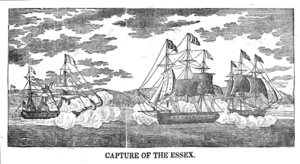South America Station
| Commander-in-Chief South America | |
|---|---|
 | |
| Country | |
| Branch | |
| Type | Formation |
The South America Station was a formation of the Royal Navy which existed from 1808 to 1838 when it was split into the Pacific Station and the South East Coast of America Station.
Following the invasion of Portugal by Napoleon, the Portuguese court escaped to Brazil with an escort of the Royal Navy under the command of Admiral Sidney Smith. Following the establishment of the Portuguese Court in Rio de Janeiro in early 1808, was shortly followed by the reinforcement of Smith's escort and the establishment of the Brazil or South America Station.
The commander-in-chief heading the formation played a diplomatic role in South America in the early nineteenth century as the British diplomatic service was limited to having a representative in Brazil.[1]
Commanders-in-chief
[edit]| List of commanders-in-chief, South America (1808–1837)[2][3] | |||
|---|---|---|---|
| Commander-in-chief | From | Until | Notes |
| Rear Admiral William Sidney Smith | 25 January 1808 | 17 May 1809 | |
| Vice Admiral Michael de Courcy | 18 May 1809 | 1812 | |
| Rear Admiral Manley Dixon | 1812 | 1816 | |
| Commodore William Bowles | 1816 | 17 May 1819 | |
| Commodore Thomas Hardy | 18 May 1819 | 16 November 1823 | |
| Rear Admiral George Eyre | 16 November 1823 | 1826 | |
| Rear Admiral Robert Otway[4] | 1826 | 1829 | Later promoted to Admiral, flagship was HMS Ganges |
| Rear Admiral Thomas Baker | 9 January 1829 | January 1833 | Promoted to vice admiral 10 January 1837 |
| Rear Admiral Sir Michael Seymour | 1 January 1833 | 9 July 1834 | Died en route to station |
| Commodore Francis Mason | July 1834 | 16 September 1834 | Temporary command after death of Seymour |
| Vice Admiral Graham Hammond | 16 September 1834 | 17 May 1838 | Promoted to Vice Admiral 10 January 1837 |
References
[edit]- ^ Thienel, Phillip M. (1963). "Review: The Navy and South America, 1801-1823: the Correspondence of the Commanders-in-Chief on the South American Station". The Americas. 20 (2): 223–224. doi:10.2307/979149. ISSN 0003-1615. JSTOR 979149.
- ^ Ortiz-Sotelo, Jorge (1998). Peru and the British naval station (1808-1839) (Thesis). University of St Andrews Library. hdl:10023/2958.
- ^ Davis, Peter. "Principal Royal Navy Commanders-in-Chief 1830-1899". Retrieved 2010-02-18.
- ^ "HMS Ganges circa late 1800s - Wisdom is strength". Retrieved 2010-03-07.
